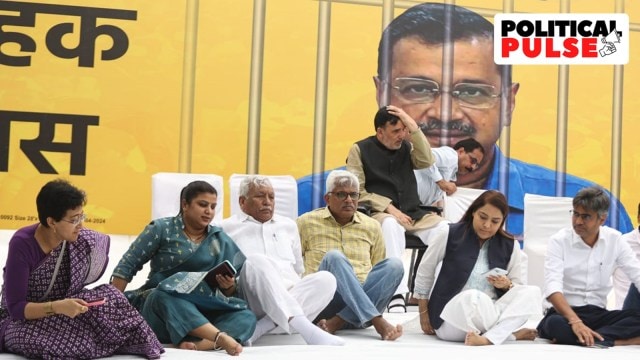© The Indian Express Pvt Ltd
Latest Comment
Post Comment
Read Comments
 Senior AAP leaders observe a 'Samuhik Upwas' against the arrest of Delhi CM Arvind Kejriwal at Jantar Mantar on Sunday. (Express photo by Praveen Khanna)
Senior AAP leaders observe a 'Samuhik Upwas' against the arrest of Delhi CM Arvind Kejriwal at Jantar Mantar on Sunday. (Express photo by Praveen Khanna)A week after the INDIA bloc’s massive rally at the Ramlila Maidan, the Aam Aadmi Party (AAP) on Sunday protested against the arrest of Delhi Chief Minister Arvind Kejriwal with a mass hunger strike at Jantar Mantar in Delhi and in some other parts of the country.
Fasts and hunger strikes have frequently been used as political tools in India, popularised by Mahatma Gandhi during the freedom struggle against the British colonial government. Gandhi, who described fasts as “a great weapon in the armoury of Satyagraha”, undertook this form of protest at least 20 times during the Independence movement. His longest hunger strike came in 1943 when he fasted for 21 days against his detention over disturbances caused during the Quit India movement.
The first major fast-unto-death protest in independent India came in 1952 when Potti Sriramulu stopped eating over his demand for a separate state of Andhra Pradesh. Sriramulu’s death after 58 days sparked violent protests and finally led to the government carving Andhra Pradesh out of the then Madras state in 1953.
In 1969, Sikh leader Darshan Singh Pheruman also fasted unto death over the inclusion of Punjabi-speaking regions, including Chandigarh, within the then newly created Punjab state. He died after fasting for 74 days.
In November 2000, after 10 civilians were allegedly gunned down by the 8th Assam Rifles in Manipur, then 28-year-old activist Irom Sharmila began an indefinite hunger strike against the killing and later against the Armed Forces Special Powers Act (AFSPA). Three days after she began her fast, Irom was arrested for “attempting suicide” and remained in police custody for 16 years where she continued her hunger strike and came to be known as the Iron Lady of Manipur. She ended her fast in 2016 without achieving her goal.
During her fast, she was force-fed through a tube, an act that international groups from the United Nations to the International Red Cross described as a “form of torture” and a violation of prisoners’ right to refuse food. In 2021, the Madras High Court ruled that a hunger strike would not constitute an attempt to commit suicide.
In 2006, Trinamool Congress chief Mamata Banerjee used a hunger strike to protest against “forcible land acquisitions” through which the Left government in West Bengal allocated land to the Tata Group for its Nano factory. She called off her 25-day hunger strike following appeals by then President A P J Abdul Kalam and Prime Minister Manmohan Singh, and Tata eventually withdrew from the state. The incident proved to be a turning point for Bengal politics and catapulted Mamata to power five years later in the 2011 Assembly polls, which ended the Left’s rule of over three decades.
In 2009, Telangana Rashtra Samithi leader K Chandrasekhar Rao, or KCR, began a fast-unto-death demanding statehood. The Congress, which at the time was also under pressure nationally, relented within 10 days, promising the creation of the state of Telangana. After extensive discussion on the specifics of the state boundary and the choice of capital, Telangana came into existence around four and a half years later in 2014 with KCR as its first CM.
In 2011, activist Anna Hazare’s movement against corruption put hunger strikes to the forefront of national discourse. Less than four days into his indefinite fast, the government agreed to his demands and set up a committee to draft the Lokpal Bill, which was eventually passed by Parliament in 2013. The AAP’s roots go back to Hazare’s movement, with Kejriwal among those involved in the anti-corruption protests.
Former Andhra Pradesh CM and Telugu Desam Party chief N Chandrababu Naidu went on a hunger strike in 2018 over special status demand for the state. Naidu went on to snap ties with then ally the BJP over this protest. The same year, activist-turned-politician Hardik Patel began a fast to demand reservation for Patidar youths in government jobs and education as well as farm loan waiver.
In late 2020, following the passage of the three controversial farm laws by the BJP government, farmers began a nationwide protest, which included a relay hunger strike to pressure the Centre to repeal the laws.
In recent months, activist Manoj Jarange-Patil has led a series of fasts to demand reservations for the Maratha community in Maharashtra. In February, the state Assembly passed a 10% reservation in jobs and educational institutes. Last month, climate activist Sonam Wangchuk started a 21-day hunger strike to demand constitutional safeguards for the Union Territory of Ladakh, and the protection of its ecologically fragile ecosystem from industrial and mining lobbies. He also called for a “Pashmina March” from Leh to the Line of Actual Control (LAC) but later withdrew the plan amid fears of violence.


